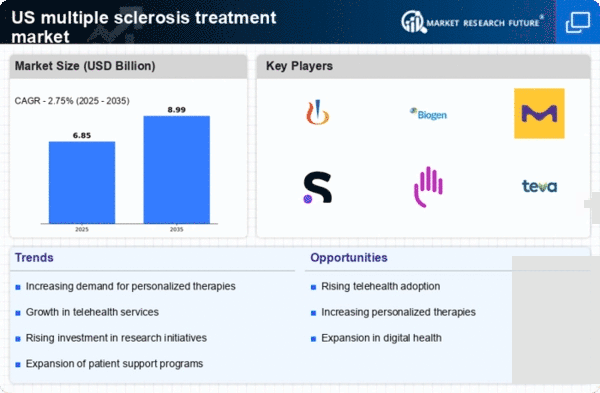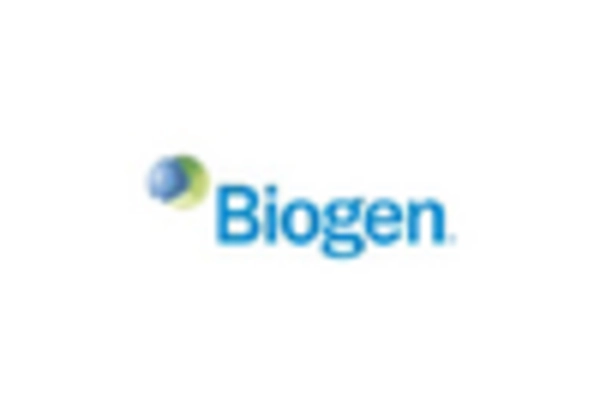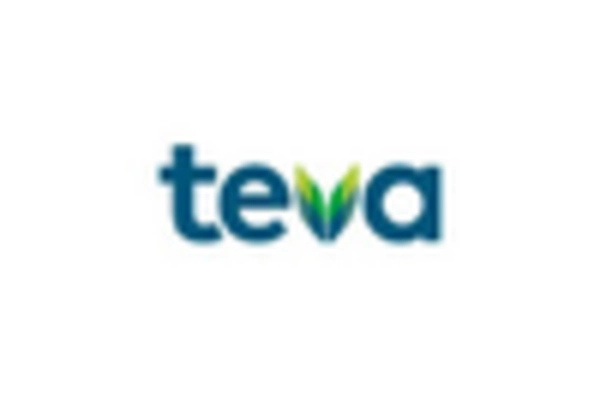The multiple sclerosis-treatment market is characterized by a dynamic competitive landscape, driven by innovation, strategic partnerships, and a focus on patient-centric solutions. Key players such as Biogen (US), Novartis (CH), and Sanofi (FR) are at the forefront, each employing distinct strategies to enhance their market presence. Biogen (US) emphasizes its commitment to research and development, particularly in advancing therapies that address unmet medical needs. In contrast, Novartis (CH) focuses on expanding its portfolio through strategic acquisitions and collaborations, thereby enhancing its therapeutic offerings. Sanofi (FR) is actively pursuing digital transformation initiatives to improve patient engagement and streamline operations, reflecting a broader trend towards integrating technology in healthcare delivery. The business tactics employed by these companies include localizing manufacturing and optimizing supply chains to enhance efficiency and responsiveness to market demands. The competitive structure of the market appears moderately fragmented, with several players vying for market share. However, the collective influence of major companies shapes a landscape where innovation and strategic positioning are paramount, allowing them to navigate challenges and capitalize on growth opportunities. In October 2025, Biogen (US) announced a groundbreaking partnership with a leading technology firm to develop AI-driven solutions aimed at improving patient outcomes in multiple sclerosis treatment. This strategic move underscores Biogen's commitment to leveraging technology to enhance therapeutic efficacy and patient monitoring, potentially setting a new standard in the industry. The integration of AI into treatment protocols may significantly improve personalized care, aligning with the growing trend towards precision medicine. In September 2025, Novartis (CH) completed the acquisition of a biotech company specializing in novel MS therapies, thereby expanding its pipeline and reinforcing its position in the market. This acquisition is strategically important as it not only diversifies Novartis's offerings but also accelerates its entry into emerging therapeutic areas, which could lead to enhanced competitive differentiation in a crowded marketplace. The move reflects a broader trend of consolidation within the industry, as companies seek to bolster their capabilities through strategic mergers. In August 2025, Sanofi (FR) launched a new digital platform designed to facilitate remote patient monitoring and enhance treatment adherence for multiple sclerosis patients. This initiative is indicative of Sanofi's strategic focus on digital health solutions, which are increasingly vital in managing chronic conditions. By prioritizing patient engagement through technology, Sanofi positions itself as a leader in the evolving landscape of healthcare delivery, where patient-centric approaches are becoming essential. As of November 2025, current trends in the multiple sclerosis-treatment market indicate a shift towards digitalization, sustainability, and the integration of advanced technologies such as AI. Strategic alliances are increasingly shaping the competitive landscape, enabling companies to pool resources and expertise to drive innovation. Looking ahead, competitive differentiation is likely to evolve from traditional price-based competition to a focus on innovation, technological advancements, and supply chain reliability. This shift suggests that companies that prioritize research, patient engagement, and operational efficiency will be better positioned to thrive in the future.

















